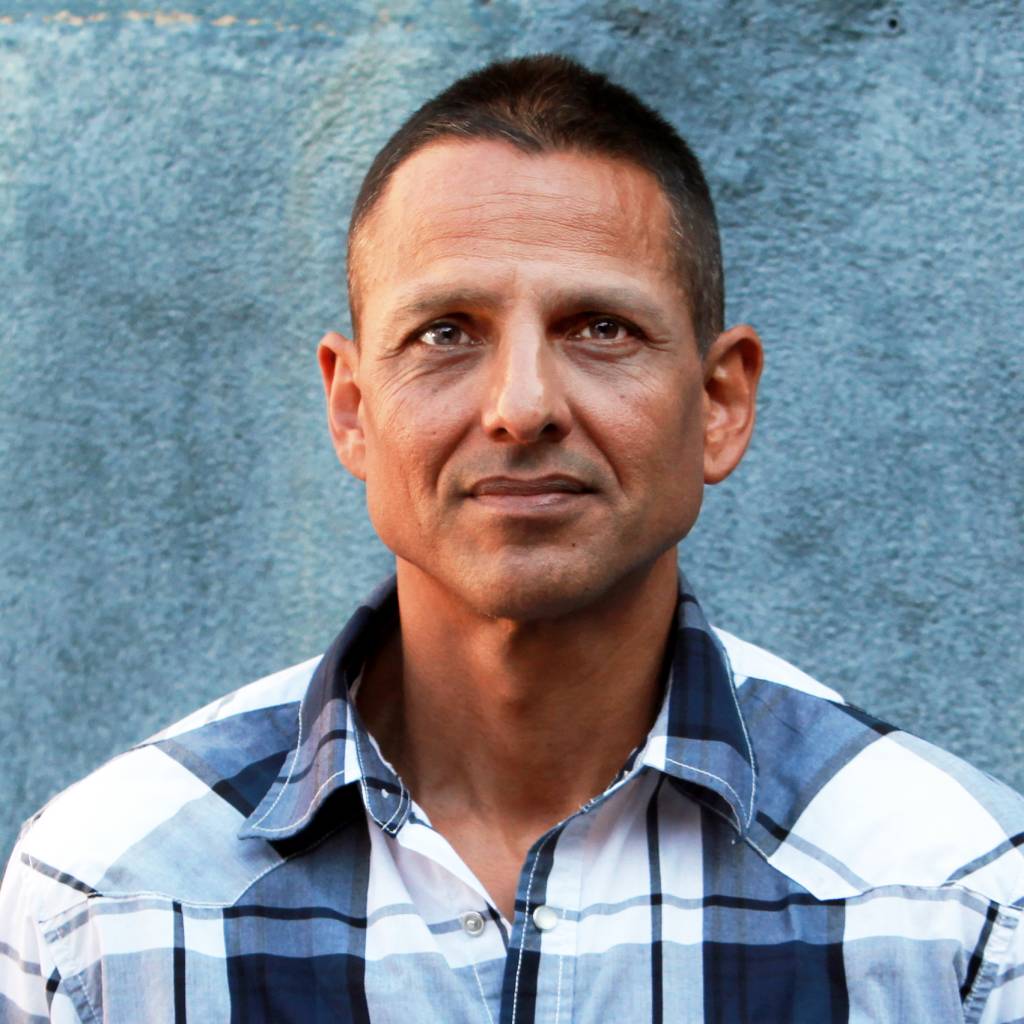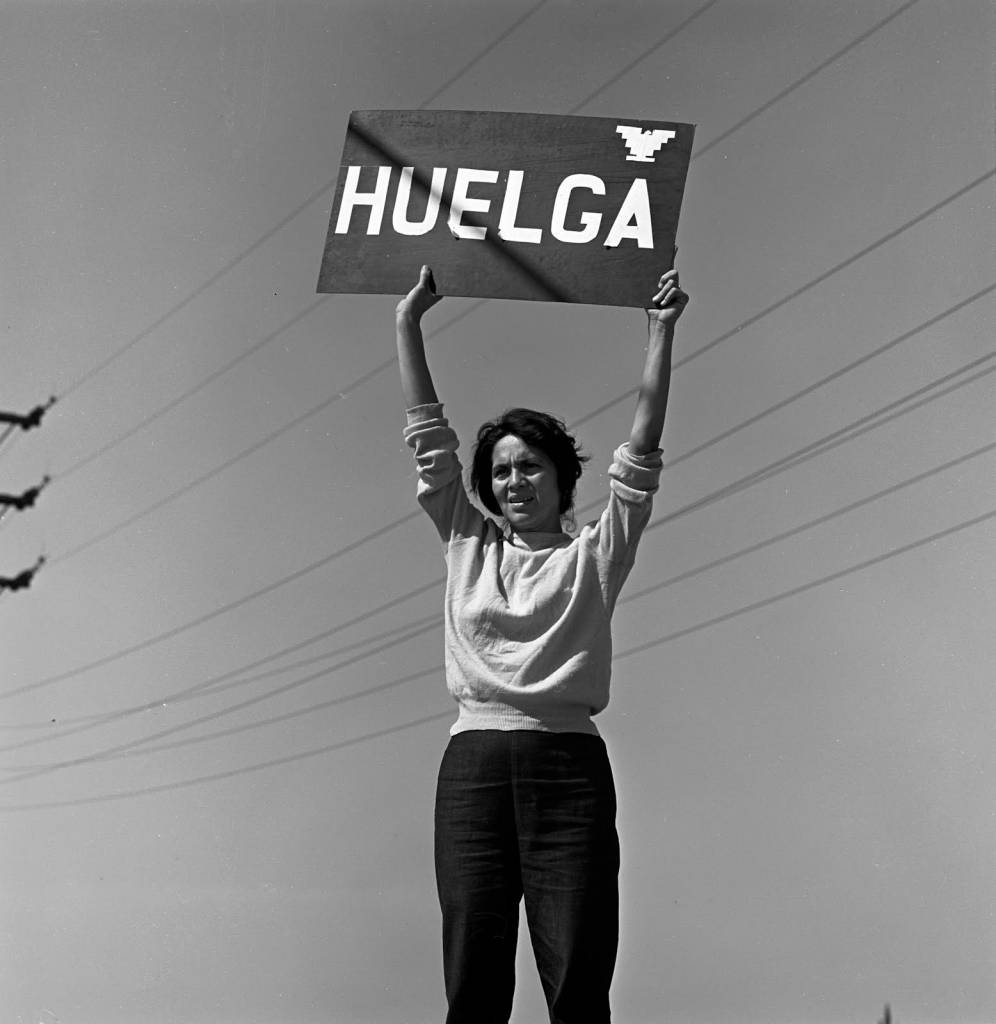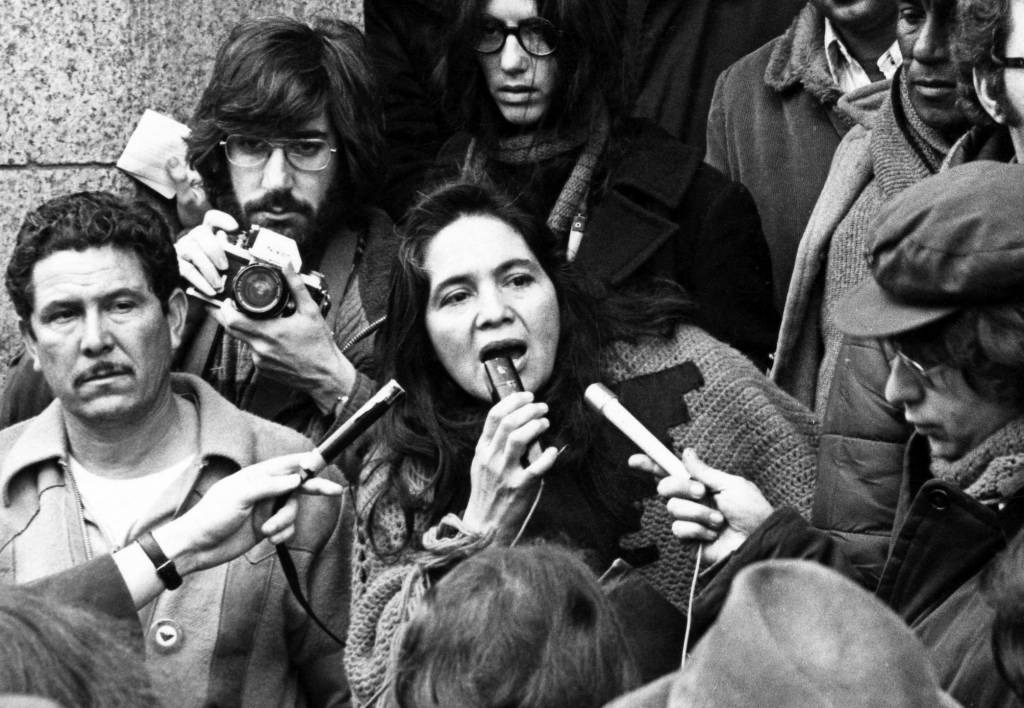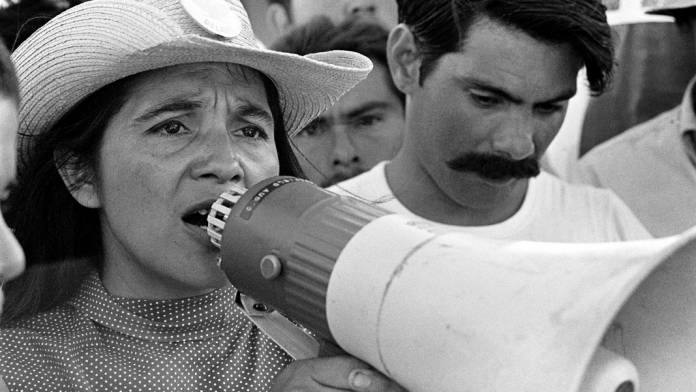In 1962, political organizer Dolores Huerta was a twice-divorced mother of seven. She had also just told Cesar Chávez that she would join him in an endeavor that at the time defied common sense, if not historical precedent: starting a union for California farmworkers.
The stakes were high, but the tireless Huerta proved to be a phenomenon. She ensured that the United Farmworkers Union held space for women in important roles (unlike most of the labor movement at the time) and utilized innovative organizing techniques that eventually secured the country’s first union contracts for agricultural workers. Her largely Chicano group of low income workers marched the highways of California to the State Capitol, and launched a national grape boycott that succeeded in toppling growers’ violent incredulity that their employees could organize. Huerta was arrested 22 times for the cause and in 1988 a police officer’s baton ruptured the grandmother’s spleen at a Union Square protest of a George Bush Sr. fundraising dinner.
Undaunted and steeled, Huerta has added her voice to the feminism movement, to the struggle for LGBTQ rights, to early environmentalism campaigns in her fight against the use of pesticides in growing our food. She eventually created the Dolores Huerta Foundation, which focuses on getting Chicanos elected to public office through grassroots organizing.
But then in 2006, she got too real during a talk with Arizona schoolkids. A heartfelt “Republicans hate Latinos” from Huerta was all it took for politicians to launch the campaign that eventually banned Mexican Studies entirely from Tucson’s public schools. It was a not so subtle hint that social justice heroes can still be erased for future generations by the powers that be. (Happily HB2281 was ruled unconstitutional just last week, although it remains on the books for the time being.)
Even Barack Obama forgot who coined “sí se puede” when he appropriated a translation of Huerta’s phrase for his 2008 campaign (he thought it was Chávez’s term, indicative of a greater issue with people attributing Huerta’s work to her vaunted male counterpart), but he apologized upon awarding Huerta the Presidential Medal of Freedom. “Dolores does not play,” he said on the occasion.
Now a new documentary, Dolores, made by Carlos Santana and Peter Bratt about the life of Huerta, could not come at a better time. Say what you will about her endorsement of Hillary in the election, Huerta is the reason history books exist.
A few days after the white supremacist rally in Charlottesville where a participant killed protestor Heather Heyer, 48 Hills had the opportunity to speak with Huerta and Dolores director Peter Bratt, brother of Benjamin Bratt, the SF native and actor-director who created La Misión. They talked about the power of memory, and the unique opportunities available to a country mired in the early days of an unjust administration.
48 HILLS Peter, my first question is for you. Why did you think the world needed a documentary about Dolores in this moment?
PETER BRATT When Carlos approached me about making the film four and a half years ago we had no idea that Donald Trump would be elected to the highest office in the country. We certainly had no idea that we’d see what has transpired over the last few days in this country. Seeing what’s going on gives the film a whole different kind of urgency and relevance that I don’t think we foresaw when we set out to make it.
48 HILLS Dolores, the pressures on your family situation are dealt with in the film very openly. Why did you think it was important to be so up front in this documentary about the challenges that your dedication to organizing posed to your children?
DOLORES HUERTA I think that was more Peter’s idea. My youngest daughter Camila, is the executive director of my foundation. In the film she has these big tears about her mother being gone, but when she went to Mills College, on her first day she calls me from the dorm phone and she goes “Mom, you won’t believe this, but there are girls here who are crying for their mothers.” (laughs) It was painful for me to see [them tell painful stories in the film], but the thing is that my kids came out very resourceful, they came out strong. But the one thing I did want to say to all the mothers out there; bring your children to demonstrations. Bring them to the picket line. You didn’t have to tell my children about the movement, because they lived it.

PETER BRATT When Carlos [Santana, the film’s producer] and I talked about from early on is that oftentimes when historical biographies are done on great leaders, they become inaccessible to their audience. The audience cannot see him- or herself in that leader’s struggle. We wanted to humanize Dolores and make her real, make her down to earth. One of the things we’ve seen subsequently, particularly with Latin women, is that they can relate to her, they can see themselves in her own struggle. Especially today when you have both fathers and mothers working two jobs — sometimes three jobs in Latino communities — feeling torn about leaving your children in child care. My wife and I, we struggle with that ourselves.
48 HILLS Dolores, your father and son have held or are currently running for political office. Did you ever think about running for public office?
DOLORES HUERTA No, I really don’t. I believe that I’m an organizer at heart, this is what I love to do and I would rather organize to get good people in and take out the bad guys. (Laughs.) I try to get progressive candidates elected, it’s what we do with our foundation. We do a lot of voter registration, getting out the vote. In place where we have been organizing, people will vote 15 percent higher than the rest of the county. We have organized in very conservative counties, and tried to get people to run for office. We have some of our residents that we’ve organized are on school boards, water boards, city councils, recreation boards. These are farmworkers — women, men, just ordinary people, they don’t have a college degree, but they get on those boards and they can make a lot of difference.
48 HILLS How has the election of Trump changed the work that your foundation does?
DOLORES HUERTA I think it adds a lot more urgency. Of course, we do a lot with the deportations, the people who are being deported, families that have been separated in the farmworker community. At the same time the growers are making plans to bring in what they call H-2A farmworkers, also from Mexico! They’re deporting people and at the same time planned to bring in more people on a farmworker contract. It’s a step above slavery. These workers cannot join a union, they cannot get unemployment insurance, they can’t get residency in the United States, they can’t social security. It’s a step above slavery, and unfortunately that’s exactly what the Trump administration is planning to do.
PETER BRATT Huge step backwards.
DOLORES HUERTA Senator Feinstein has a bill in the Congress for what they call a blue visa, so that the farmworkers who are undocumented can stay here and work. With what they call a blue visa, they wouldn’t have to be separated from their families like they are with deportation.
48 HILLS One of the points the film touches on is the importance of self-love. Recent weeks have brought some particularly frightening headlines to the United States. Dolores, do you have tips for people on how to persevere and maintain that self love in the United States of America of 2017?

DOLORES HUERTA The only way we can end racism in our country, and misogyny, homophobia, is to start teaching children, even in kindergarten, about the contributions of people of color. Native Americans were the first slaves in the United States, and African people built the White House and Congress. People from Mexico and Asia were the ones who built the infrastructure of this country, and that is not taught. We wouldn’t have an eight hour day, we wouldn’t have social security, worker’s compensation, all these things that we take for granted — safety standards — that we wouldn’t have if it weren’t for the labor unions. [Education is] something that is incumbent on us now, especially when we see the demonstrations in Virginia. I think that this is one way that we can take a big step towards eradicating all of these isms in our society that are destroying our country.
48 HILLS Speaking of the labor movement, can you talk about where you see important or exciting organizing happening in the labor movement these days?
DOLORES HUERTA I think the whole campaign to raise the minimum wage to 15 dollars an hour is an important campaign, and that is being financed primarily by labor. We know that much of the organization in labor is in the public health area and the service industry because of the loss of manufacturing jobs — and lot of the union’s strength in manufacturing jobs has gone down. The teacher’s union has a challenge with charter schools, because many of them do not support the teachers having their own organization. That is a big threat, because if we don’t have public education, that is a threat to our democracy. Franklin Delano Roosevelt said that education is the soul of our country, so when we see that it is being privatized, that is a big threat to our democracy.
48 HILLS Do you see any potential for positives during the Trump era? Are there any points of strength that people can take out of this drastically horrible period in our nation’s history?
DOLORES HUERTA Very definitely. I lived through the 1960s, when we had Nixon and Reagan and all these other people and we survived the ‘60s and we came out stronger. I think that this is going to happen even more. You think about what happened in Charlottesville, the next day you had all these massive demonstrations against the Neo Nazis and the alt right. This really shows that the power is in the people and the people can change it. But we’ve got to bring that to voting, to running for office, for progressives to take over the legislature, like my son who is running for Congress. He’s a civil rights attorney, public interests attorney — we’ve got to get our people who are concerned about justice, we’ve got to get them elected to all the policy-making boards.

48 HILLS What qualities make an effective organizer? This question can be for both of you.
PETER BRATT In making this film I’ve learned that issues crosspollinate and are linked together. I think that activism today has to reflect that. The buzzword these days is intersectionality and I think that Dolores for me is someone who lives at that intersection, and the film makes that apparent.
DOLORES HUERTA One thing is that you’ve got to reach out to other people to join you. You can’t do it by yourself, that’s the main thing that organizers have to learn. Don’t take it personal when people don’t want to join your movement, you’ve got to have that emotional fortitude to take that rejection and keep on going. Have it so deep in your heart that when people say no, you know that they just haven’t heard the message yet. Not to turn on them, or fight with them — come back to them later on. Just keep going and don’t quit.
Figure out how to deliver your message. Every person that you meet is a potential person that can join your movement. Don’t worry if you don’t start out with a thousand people, all it takes is a couple people to get started. When Cesar and I and his wife Helen started the United Farmworkers, there was just the three of us. Later on we were joined by his cousin and brother and little by little it grew until we had a house of people on our side, and then millions when we did the grape boycott.
You have to have a lot of faith in yourself, and faith in the people you’re trying to organize. Keep on going and don’t worry about making mistakes, because mistakes are natural. Learn from the things that can be improved and don’t be too hard on yourself. And learn how to celebrate! We need a lot of organizers now to go out and protest and to resist what Trump is doing.
Dolores opens Sept. 8 at Landmark Embarcadero, Landmark Shattuck, and the Christopher B. Smith Rafael Film Center.
> Need a car to get there? Rent one in your neighborhood on Getaround. Sign up today, and enjoy $50 off your first trip: http://get.co/48h. [Sponsored]







